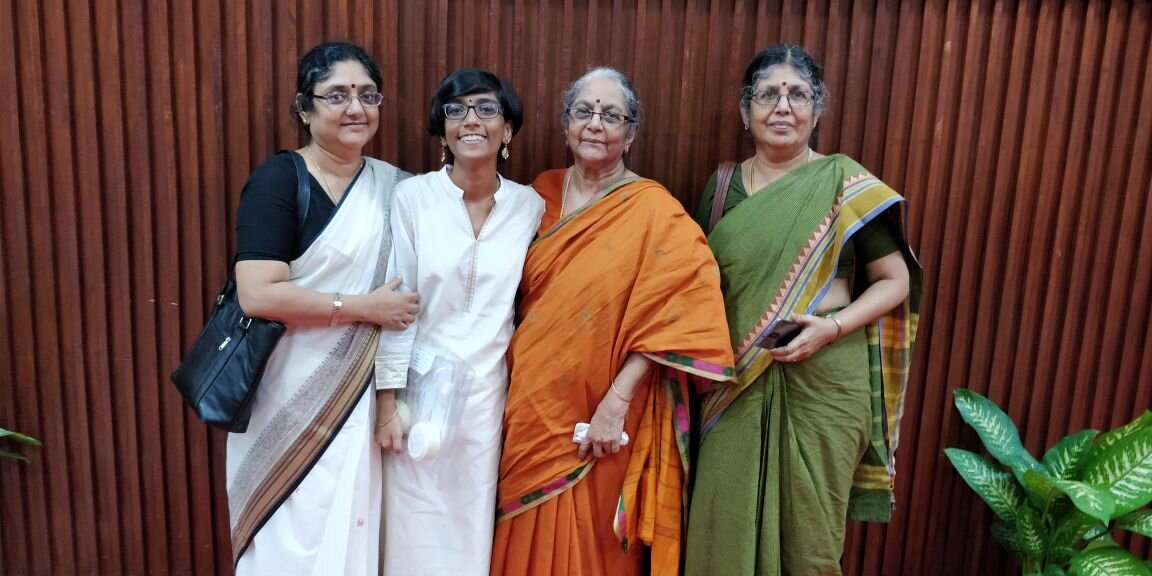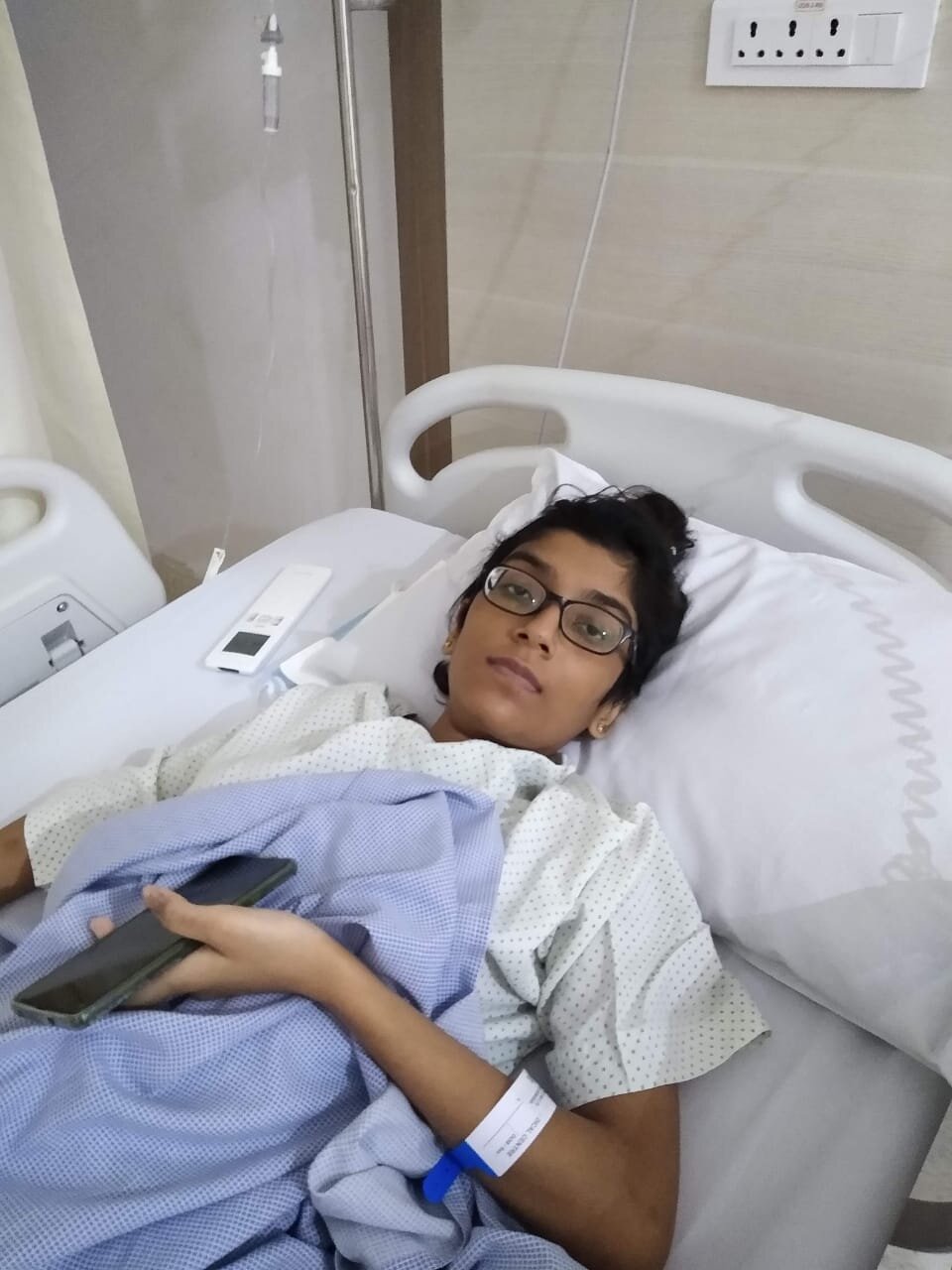Community Connection | IBD

Image of Madhura and her pillars of strength— her mother, grandmother, and grandaunt— at a university event.
This post is brought to you as part of Girls With Gut’s Community Connection in collaboration with Tina Aswani-Omprakash of Own Your Crohn’s.
I am Madhura Balasubramaniam and I live in India. I have been locked in battle with my intestines for as long as I can remember. I spent a large part of my early childhood dealing with constant spells of stomach pain, diarrhea, vomiting, and rashes. I struggled to meet my height and weight targets and had multiple nutritional deficiencies. When I was 10 years old, I was given a tentative diagnosis of celiac disease and I have been gluten-free since. While this diet seemed to provide pain relief, I remained underweight and anemic.
In mid-2018, I began to experience occasional bouts of watery diarrhea and fatigue. I was traveling frequently for work and assumed that I had picked up a stomach infection along the way. However, by mid-2019, the diarrhea episodes became more frequent, I started losing weight and I went in for a consultation. Given my medical history, I was immediately put through a number of tests revealing that I had Crohn’s Disease.
My journey with Crohn’s disease has been tumultuous. It took me more than a year to find a medication that worked for me. In India, the first line of treatment for IBD is often aminosalicylates (5-ASAs) and they failed to control my inflammation. I continued to flare as the Covid-19 pandemic raged on and India went into a nationwide lockdown in 2020. By the time I could access care with my GI, I had become quite unwell. I developed skin lesions on both my legs. A skin biopsy left me with open ulcers on my shin and I was diagnosed with pyoderma gangrenosum. At this point, I had also become steroid-dependent, experienced severe pain whenever I ate and had started losing weight again. By August 2019, I was down to 34 kgs (approximately 75 lbs!)
While I waited to complete live vaccinations so that my treatment could be escalated to immunosuppressants and/or biologics, my GI offered me a PEG (percutaneous endoscopic gastrostomy) feeding tube to assist me with enteral nutrition. While I was on oral enteral nutrition already, it was not adequate to stabilize my weight. I also found it very difficult to drink large quantities of formulas orally. We decided that I would go on Partial Enteral Nutrition (PEN) and eat whatever I could tolerate orally.
It has been a life-altering decision. Within a month of starting the feeds, my regular vomiting spells ceased, my episodes of diarrhea decreased and my weight stabilised. Over the last 6 months of being tube-fed, I have gained 10kgs and reached a healthy weight range for the first time in my life. During this period, I was put on weekly injections of Methotrexate. I am slowly moving towards remission now.
My Crohn’s diagnosis and treatment have had a significant impact on my career as a qualitative social sciences researcher. Prior to my diagnosis, I studied refugee rights of the Tibetan community in India, and I engaged in field research in a number of Tibetan settlements. However, between my Crohn’s symptoms and the treatments that put me at a higher risk of contracting infections, conducting fieldwork over extended durations became dangerous for me. Once I am able to return to work, I hope to re-train in other methods of conducting research that would help me work within the constraints of my health.

Image of Madhura laying in a hospital bed recuperating after an emergency hospitalization in the middle of the national lockdown.
There is a lot of shame attached to bowel diseases in South Asian culture. We are repeatedly told such topics should not be discussed in public. This leads many in my community to suffer in silence. I kept my experiences of managing celiac disease under wraps for many years, only sharing it when absolutely necessary. With Crohn’s, I started talking about my experiences right away, initially to a restricted audience on Instagram and later in a more public manner. I found that sharing helped me process and make sense of my experiences. It also helped me find a community of incredibly warm and supportive IBD warriors.
While I agreed to a feeding tube almost immediately and my mother was completely supportive of the decision, it was only after I had my tube placed that I realised how deeply stigmatized feeding tubes are in South Asian communities. It struck me that I did not know anyone else with a feeding tube and I could not find South Asian support groups for patients with feeding tubes and their caregivers. Making matters worse was the reality that many people, from hospital staff to family members, viewed feeding tubes as the end of the road.
It really made me aware of the amount of misinformation and fears surrounding a life-changing medical intervention. For me, the tube was a turning point in my IBD journey, one that empowered me. Along with finding the right treatment option, my feeding tube has helped tremendously in improving my quality of life. I was really struggling and needed help with a number of everyday activities. Getting the feeding tube was incredibly liberating because it gave the reins of managing my condition back to me and I am proud to own that decision.
A significant challenge in managing IBD in South Asia is access to appropriate treatment. This is a real struggle for many patients, especially those who need biologics to manage their conditions. Unfortunately, with a lack of health insurance coverage for biologics, most patients cannot afford to be on this line of treatment in a prolonged manner and must discontinue biologics within a year or two. Personally, my condition is being monitored closely and my GI and I have worked on a plan of escalation to adopt biologics when required. These financial considerations add to the stress of managing a serious, progressive chronic illness.
In addition, the stigma and psychosocial barriers associated with choosing modern medication to treat IBD is a real challenge to accessing care in South Asia. While my mother has been supportive of my choice, others question and scrutinize my decision to not shift to alternative therapies like Ayurveda. Perhaps most tragically, some of this judgment permeates online patient support groups, making it that much more difficult to stick with these medical decisions.
I do hope to see better insurance coverage for those of us with autoimmune conditions that need to stay on biologics to keep our conditions at bay. I hope that those of us who need care can access it irrespective of our socioeconomic backgrounds. With better education around IBD and its treatment protocols (both medication and surgery), I hope that choosing modern medical treatment for IBD is embraced, considered acceptable, and eventually normalised in India.
I would be remiss if I did not mention the role that my support system has played in helping me accept and manage my IBD. My mother has been my primary caregiver and the biggest source of strength throughout my journey thus far. She has been my strongest advocate and has ensured that I always received the best care available. Along with my grandmother and great aunt, my mother completely backed my decisions, shielded me from people questioning our decisions, and helped me embrace my illnesses and my feeding tube. My best friend and my mentor have both supported me throughout this journey by educating themselves and by being empathetic listeners. They have held a safe space for me to open up, share about my struggles and ask for help. These support systems go a long way in enabling us to thrive even as we cope with chronic conditions like IBD.
For those living with IBD in South Asia, it is critical to remember that it is your right to select the treatment that is right for you. Never allow others to pressure you to reject modern medical interventions like biologics and feeding tubes. If you have been offered these interventions, please don’t hesitate to grab the opportunity, and do not forget to buckle up for a wonderful journey!

Madhura Balasubramaniam is a Crohn’s patient. Diagnosed in 2019, Madhura lives with a PEG feeding tube. She is a co-founder of IBDesis, a platform to support and empower South Asian patients living with IBD across the world. She has a Master’s degree in Development Studies from the Indian Institute of Technology Madras and is currently an independent researcher based in Chennai, India.
